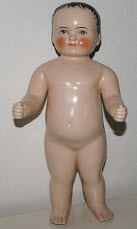This poem or song is the basis for calling the porcelain nude bath dolls “Frozen Charlotte”. The poem- song came out sometime near when the dolls could be found in stores. I have not heard this sung nor seen music for it…I would not call this a song for children thou but it was another time!
Young Charlotte (Collected by Kenneth Peacock)with lyrics
(Frozen Charlotte)
Now, Charlotte lived on the mountainside,
In a bleak and dreary spot;
There was no house for miles around,
Except her father’s cot.
And yet on many a wintry night,
Young swains were gathered there;
For her father kept a social board,
And she was very fair.
One New Year’s Eve as the sun went down,
Far looked her wishful eye
Out from the frosty window pane
As merry sleighs went by.
In a village fifteen miles away,
Was to be a ball that night;
And though the air was heavy and cold,
Her heart was warm and light.
How brightly beamed her laughing eye,
As a well-known voice was heard;
And driving up to the cottage door,
Her lover’s sleigh appeared.
“O, daughter dear,” her mother cried,
“This blanket ’round you fold;
It is a dreadful night tonight,
You’ll catch your death of cold.”
“O, nay! O, nay!” young Charlotte cried,
And she laughed like a gypsy queen;
“To ride in blankets muffled up,
I never would be seen.
“My silken cloak is quite enough,
You know ’tis lined throughout;
Besides I have my silken scarf,
To twine my neck about.”
Her bonnet and her gloves were on,
She stepped into the sleigh;
Rode swiftly down the mountain side,
And o’er the hills away.
With muffled face and silent lips,
Five miles at length were passed;
When Charles with few and shivering words,
The silence broke at last.
“Such a dreadful night I never saw,
The reins I scarce can hold.”
Fair Charlotte shivering faintly said,
“I am exceeding cold.”
He cracked his whip, he urged his steed
Much faster than before;
And thus five other dreary miles
In silence were passed o’er.
Said Charles, “How fast the shivering ice
Is gathering on my brow.”
And Charlotte still more faintly said,
“I’m growing warmer now.”
So on they rode through frosty air
And glittering cold starlight,
Until at last the village lamps
And the ballroom came in sight.
They reached the door and Charles sprang out,
He reached his hand for her;
She sat there like a monument,
That has no power to stir.
He called her once, he called her twice,
She answered not a word;
He asked her for her hand again,
And still she never stirred.
He took her hand in his – O, God!
‘Twas cold and hard as stone;
He tore the mantle from her face,
Cold stars upon it shone.
Then quickly to the glowing hall,
Her lifeless form he bore;
Fair Charlotte’s eyes were closed in death,
Her voice was heard no more.
And there he sat down by her side,
While bitter tears did flow;
And cried, “My own, my charming bride,
You never more will know.”
He twined his arms around her neck,
He kissed her marble brow;
His thoughts flew back to where she said,
“I’m growing warmer now.”
He carried her back to the sleigh,
And with her he rode home;
And when he reached the cottage door,
O, how her parents mourned.
Her parents mourned for many a year,
And Charles wept in the gloom;
Till at last her lover died of grief,
And they both lie in one tomb.
…. Said to be based on a true event recorded in an original poem by Maine humorist and editor Seba Smith [1792-1868] and set to music by William Lorenzo Carter. [Laws G17] Native American Balladry (G. Malcolm Laws, 1950/1964) ….
This variant was collected in 1958 from Charlotte Decker of Parson’s Pond, NL, by Kenneth Peacock and published in Songs Of The Newfoundland Outports, Volume 3, pp.735-737, by The National Museum of Canada (1965) Crown Copyrights Reserved.
Kenneth Peacock noted that several attempts have been made to relate this American ballad to an actual event, all without real success. If Charlotte existed, however, we can be reasonably certain she lived somewhere in New England. What we do know is that part of the ballad appeared in The Rover in 1843 and was credited to Seba Smith, a well-known journalist of the period. It is not known whether he composed it himself or learned it from oral tradition. In any event, it has spread all over the continent and is especially popular in Newfoundland where it is sometimes called Frozen Charlotte.
The New York Observer reported on February 8, 1840, that a girl froze to death on her way to a ball on January 1, 1840.



